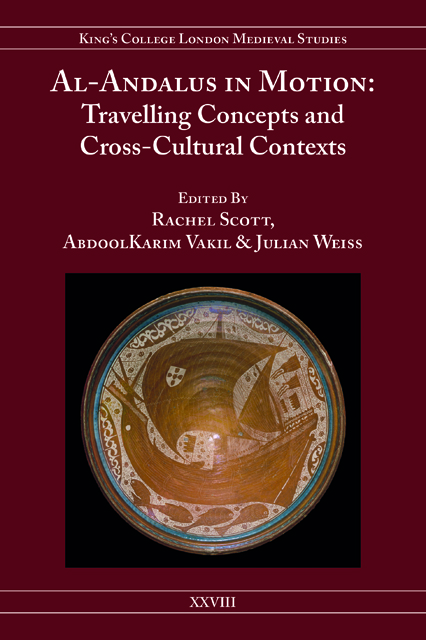Book contents
- Frontmatter
- Contents
- List of Illustrations
- Acknowledgements
- Notes on Contributors
- Part I Departure Points
- Part II Translating Al-Andalus: Travelling across Languages
- Part III (Re)Visions of Al-Andalus in Diaspora and Exile
- Part IV Andalusi Space as Node and Utopia: Europe, Islam, Empire
- Part V Al-Andalus and the Politics of Religious Identity
- Part VI Legacies, Landscapes and ‘Travel Buildings’
- Epilogue
- Index
5 - Bystanders and Borderlands: The Andalusi Frontier and the Sephardic Ballad
Published online by Cambridge University Press: 02 June 2023
- Frontmatter
- Contents
- List of Illustrations
- Acknowledgements
- Notes on Contributors
- Part I Departure Points
- Part II Translating Al-Andalus: Travelling across Languages
- Part III (Re)Visions of Al-Andalus in Diaspora and Exile
- Part IV Andalusi Space as Node and Utopia: Europe, Islam, Empire
- Part V Al-Andalus and the Politics of Religious Identity
- Part VI Legacies, Landscapes and ‘Travel Buildings’
- Epilogue
- Index
Summary
As an epilogue to her recent Modern Spain and the Sephardim: Legitimizing Identities (2018), Maite Ojeda-Mata cites the official justification for the 2015 Spanish law granting citizenship to the descendants of Jews exiled in 1492. ‘The children of Sepharad’, the law declares, ‘maintained a wealth of nostalgia immune to the evolution of languages and generations […]. In the language of their ancestors, they imitated prayers and recipes, games and ballads’ (2018: 224). As a government spokeswoman explained to the world's press, the law repays a ‘historical debt to enable those who have always wanted to be Spaniards, who have taken with them, wherever they lived, whatever their passport said, our language, our sense of belonging’. Ojeda-Mata traces the law's antecedents back to the mid-nineteenth century, and in the process she lays bare its political motivations, economic investments and historical ironies: ‘this law’, she concludes, ‘though seemingly inclusive, hides – and thus underrates – the Sephardim and their cultures, reinterpreting their cultural identities and rewriting their collective historical memories’ (2018: 226; see also 2015).
Davide Aliberti reaches similar conclusions in Sefarad: Una comunidad imaginada (1924–2015), also published in 2018. The two scholars have different perspectives and evidence, yet both call attention to the way one imagined community, Spain, subsumes the other, Sepharad. For Aliberti, the 2015 law brings about ‘the reparation of a debt and the closure of a historical cycle, which enables Spain and Sepharad to be definitively imagined as a single thing’. The claim that Spaniards and Sephardim share a ‘sense of belonging’ and that their histories and experiences exist within the same imagined frontiers, is the ideological problem explored in this essay. Using selected Sephardic ballads from modern Morocco, I argue that this particular oral form reveals a much more complex story about the imaginative affiliation between the Western Sephardim and their ‘homeland’ across the Straits of Gibraltar. Though my starting point is the 2015 Law of Return, I suggest that the popular ballad provides as yet untapped evidence for research into Spain’s colonial relationship with Morocco and ‘the shifting boundaries of Moroccan Jewish identities’ (Schroeter 2008). Since the 1990s, there has been substantial research into Moroccan Jews and their cultural and political ties to Spain from 1492 to the present. To my knowledge, no study on Spanish/Moroccan relations draws extensively on Sephardic ballads from this region.
- Type
- Chapter
- Information
- Al-Andalus in MotionTravelling Concepts and Cross-Cultural Contexts, pp. 127 - 154Publisher: Boydell & BrewerPrint publication year: 2021



